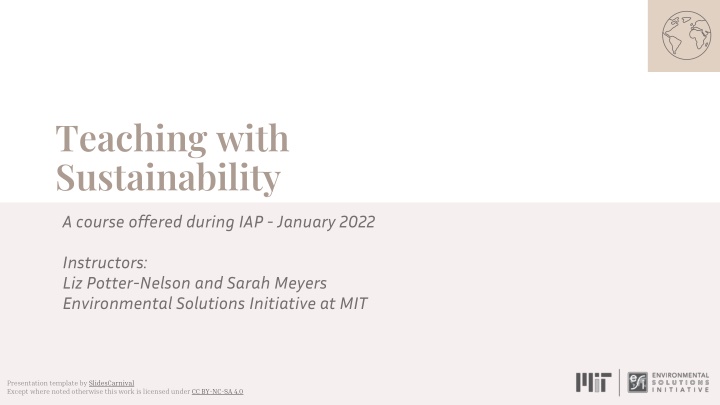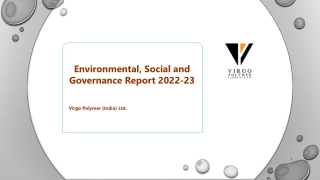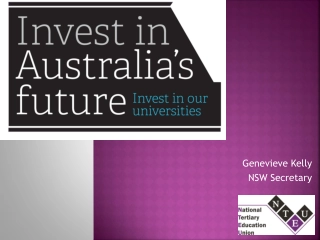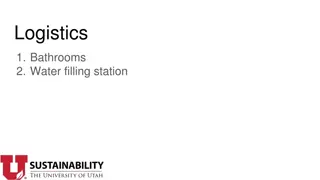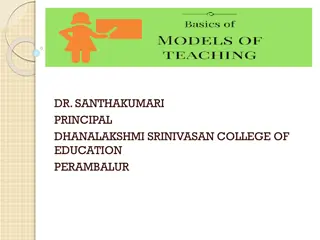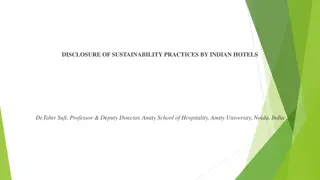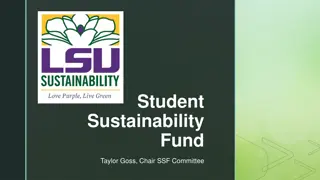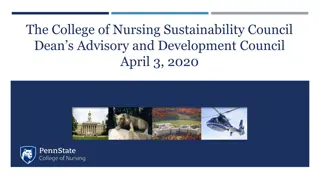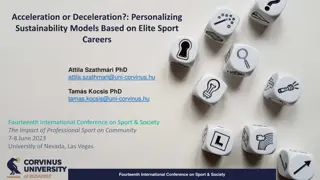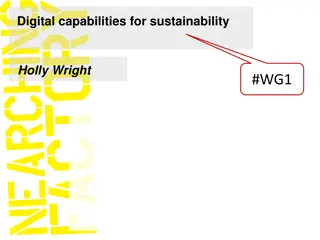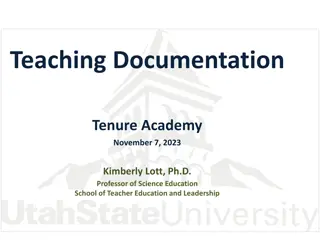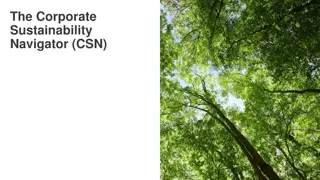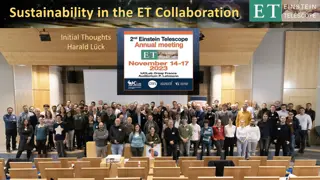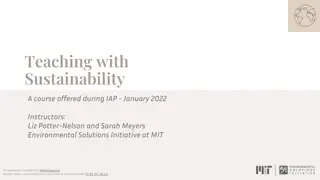Teaching with Sustainability: Enhancing Educational Practices
This course, offered by MIT in January 2022, explores sustainability education and effective teaching practices. Topics include theoretical frameworks, sustainability literacy, instructional approaches, and more. Participants will consider modifying their content and practices using a backwards design approach.
Download Presentation

Please find below an Image/Link to download the presentation.
The content on the website is provided AS IS for your information and personal use only. It may not be sold, licensed, or shared on other websites without obtaining consent from the author.If you encounter any issues during the download, it is possible that the publisher has removed the file from their server.
You are allowed to download the files provided on this website for personal or commercial use, subject to the condition that they are used lawfully. All files are the property of their respective owners.
The content on the website is provided AS IS for your information and personal use only. It may not be sold, licensed, or shared on other websites without obtaining consent from the author.
E N D
Presentation Transcript
Teaching with Sustainability A course offered during IAP - January 2022 Instructors: Liz Potter-Nelson and Sarah Meyers Environmental Solutions Initiative at MIT CC BY-NC-SA 4.0 Presentation template by SlidesCarnival CC BY-NC-SA 4.0 SlidesCarnival Presentation template by SlidesCarnival Except where noted otherwise this work is licensed under CC BY-NC-SA 4.0 SlidesCarnival CC BY-NC-SA 4.0
Overview of Topics Week 1 - What is sustainability education? Week 2 - What is effective teaching? Defining sustainability using the Brundtland Report & sustainability education Effective teaching is complex Learning theories provide a framework for how people learn Theoretical perspectives used in sustainability education Sustainability Learning Approaches Positivism vs Postpositivism Positivism and Postpositivism Activity Practicality of Sustainability Education Brief timeline of education to accomplish sustainability initiatives Explanation of a Jigsaw Activity Jigsaw activity of foundational sustainability documents Week 3 - How do we teach sustainably? Week 4 Week 4 - - What does this look like for me? What does this look like for me? Asset vs Deficit Approaches Criticism of US Education Bloom s Taxonomy Sustainability education looks to paradigm shifts Levels of implementing sustainability Level 1, Level 2, Level 3 Transitioning through Sustainability Levels Explanation of Categories of Sustainability Literacy Explanation of Categories of Sustainability Literacy Competencies Competencies Explanation of Sustainable Instructional Explanation of Sustainable Instructional Approaches Approaches Overview of Understand by Design (UbD) Overview of Understand by Design (UbD) Modified UbD Modified UbD template template Sticking Sticking Points Points CC BY-NC-SA 4.0 Presentation template by SlidesCarnival CC BY-NC-SA 4.0 SlidesCarnival 2
What does this look like for me? Week 4 CC BY-NC-SA 4.0 Presentation template by SlidesCarnival CC BY-NC-SA 4.0 SlidesCarnival
Learning Objectives for Today Participants will consider if they want to modify their content, their practices or both! Participants will use a modified backwards design approach to start the planning process to (re)vision their activities CC BY-NC-SA 4.0 Presentation template by SlidesCarnival CC BY-NC-SA 4.0 SlidesCarnival 4
Opening Activity What type of activity/lesson/course did you bring to work on today? What do you want students to know and be able to do after your modifications? CC BY-NC-SA 4.0 Presentation template by SlidesCarnival CC BY-NC-SA 4.0 SlidesCarnival 5
Where do I start? Categories of Sustainability Competencies Sustainability Instructional Approaches Sustainability Knowledge Systems Thinking Social Justice Futures Thinking Active Citizenship Content Knowledge Collaborative, Small Group Learning Inquiry-based Learning Experiential Learning Service Learning Place-based Learning Culturally Sustained Learning CC BY-NC-SA 4.0 Presentation template by SlidesCarnival CC BY-NC-SA 4.0 SlidesCarnival 6
Categories of Sustainability Literacy Competencies Numerous different scholars have weighed in on the knowledge, skills, and dispositions necessary to be considered sustainability literate Wide variety in what and how much is included in these lists These categories help us think about the different ways that sustainability is present in the courses we teach. Each of these lists start to fall into the following categories: Sustainability Knowledge Systems Thinking Social Justice Futures Thinking Active Citizenship Content Knowledge CC BY-NC-SA 4.0 Presentation template by SlidesCarnival CC BY-NC-SA 4.0 SlidesCarnival 7
Categories of Sustainability Literacy Competencies Sustainability Knowledge Explanation Addresses the interconnection of environmental, social and economic perspectives Builds past the tradition of an environmental or ecological way of knowing Embracing and including the interplay between the social and economic perspectives. Focus of this Category of Competency Builds capacity for greater understanding of sustainability through environmental, social, human health, and/or economic perspectives Explicit connection to course content and sustainability perspectives Examples Drawdown Discussion Questions Reading Guide Homework 1 & 2 in the list CC BY-NC-SA 4.0 Presentation template by SlidesCarnival CC BY-NC-SA 4.0 SlidesCarnival 8
Categories of Sustainability Literacy Competencies Systems Thinking Explanation Encourages a return to thinking about the whole instead of individual parts of a system Looks at the links between systems and how one decision affects another system Focus of this Category of Competency Emphasizes how the content being taught is part of a larger system Encourages explanations or thinking about how the part is connected to the whole Incorporates at least two out of three perspectives of sustainability - environmental, social and/or economic Examples Paper 1 & Paper 2 Technology Critique Hometown Analysis Assignment 1 & 3 CC BY-NC-SA 4.0 Presentation template by SlidesCarnival CC BY-NC-SA 4.0 SlidesCarnival 9
Categories of Sustainability Literacy Competencies Social Justice Explanation Clearly articulates a need to provide equitable and inclusive opportunities to all Acknowledgement of, and action towards dismantling the deeply embedded systems that support and perpetuate inequality Empowers learners who have been underrepresented Focus of this Category of Competency Recognizes diversity within the context of the course material(s) Focus is on equity and identifying existing social barriers that may prevent equity Equity can be broad from equitable distribution of resources to gender-equity in decision making Examples Assignments 1, 2 & 4 Reading Guide What can a body do? Site Probes CC BY-NC-SA 4.0 Presentation template by SlidesCarnival CC BY-NC-SA 4.0 SlidesCarnival 10
Categories of Sustainability Literacy Competencies Futures Thinking Explanation Often called anticipatory thinking or intergenerational thinking Encourages instructors and learners to think about how current choices will influence the long-term future Encourages reflections on how current decisions impact future generations Focus of this Category of Competency Emphasizes how choices now will impact future generations, 150+ years from now Focus is on meeting current needs without jeopardizing the needs of future generations Could use forecasting or backcasting to draw connections between here and then CC BY-NC-SA 4.0 Presentation template by SlidesCarnival CC BY-NC-SA 4.0 SlidesCarnival Examples Dream Project & Term Project Urban Plans Problem Set 1 11
Categories of Sustainability Literacy Competencies Active Citizenship Explanation Positions the learner to connect what they are learning to either their local place or as a global citizen Encourages the connections between content and positive action within the defined community Focus of this Category of Competency Emphasizes involvement in local and/or global community Involves learning about local and/or global community and ties content back to local/global community Learning and/or action about governments, policies, laws, norms, etc A reading or a lecture likely will not be active citizenship because students are not acting Examples Health Care Reform Famine Relief Big Plan Final Communication CC BY-NC-SA 4.0 Presentation template by SlidesCarnival CC BY-NC-SA 4.0 SlidesCarnival 12
Sustainable Instructional Approaches How we teach is almost as important as what we teach Make sure our method mirrors our message (Widhalm, 2011) Sustainability Instructional Approaches (Nolet, 2016) Collaborative, Small Group Learning Inquiry-based Learning Experiential Learning Service Learning Place-based Learning Culturally Sustained Learning These approaches help us think about the different ways that our teaching practices can embody sustainability CC BY-NC-SA 4.0 Presentation template by SlidesCarnival CC BY-NC-SA 4.0 SlidesCarnival 13
Sustainable Instructional Approaches Collaborative, Small Group Learning Explanation Working in groups of 2-6, students engage in a learning experience where the initial parameters are often defined by the instructor Examples of this type of Learning Think-Pair-Share Jigsaw Activity Roundtable Discussions Examples Discussion Prompts Case Write-up Questions Project of Change or Research Paper Final Project CC BY-NC-SA 4.0 Presentation template by SlidesCarnival CC BY-NC-SA 4.0 SlidesCarnival 14
Sustainable Instructional Approaches Inquiry-based Learning Explanation Students engage in authentic, self-directed learning. Often, inquiry-based learning is collaborative In more guided inquiry experiences the instructor sets initial parameters and students follow a line of inquiry tied to the parameters Examples of this type of Learning Project-based learning Problem-based learning Design-based learning Labs Examples Papers 1-4 Term Project Tutorials; Drawdown; Dream Project Exercise; Dream Project Project CC BY-NC-SA 4.0 Presentation template by SlidesCarnival CC BY-NC-SA 4.0 SlidesCarnival 15
Sustainable Instructional Approaches Experiential Learning Explanation Provides students with direct experiences, accompanied with critical reflection Instructors select experiences for students and then serve as the facilitator while the experience is occurring Commonly conducted in informal education settings, but also serve a valuable role in formal education settings Examples of this type of Learning Field trips Field Work Internships Hands-on Lessons Examples Shading Studies & Sun Path Diagrams Problem Set 1 Field Research and Report Personal Energy Consumption Field trip CC BY-NC-SA 4.0 Presentation template by SlidesCarnival CC BY-NC-SA 4.0 SlidesCarnival 16
Sustainable Instructional Approaches Service Learning Explanation Students engage in learning through community-based service, where both the leaner and the community benefit More than just volunteering Often has components of inquiry-based, experiential, and collaborative learning Stages include: Investigation, Planning & Preparation; Action; Reflection; Demonstration/Celebration Examples of this type of Learning Experiences vary greatly Event to support local community Tutoring in a local school/after school program Conducting research with community members Examples Group Response to a Proposal Service-Learning Standards for Quality Practice CC BY-NC-SA 4.0 Presentation template by SlidesCarnival CC BY-NC-SA 4.0 SlidesCarnival 17
Sustainable Instructional Approaches Place-based Learning Explanation Students interact with their local community Students are encouraged to ask questions and investigation their local place on topics of environmental, economic and or social equity Includes components of inquiry-based, experiential and/or service learning Examples of this type of Learning Field Trip Guest Speaker Primary source documents from community Questions/Dialogue about community Examples Elemental Case Study Re-designing Massachusetts Avenue Investigating a Site in the Past or Present Neighborhoods of MIT Hometown Analysis National Environmental Policy-making CC BY-NC-SA 4.0 Presentation template by SlidesCarnival CC BY-NC-SA 4.0 SlidesCarnival 18
Sustainable Instructional Approaches Culturally Sustained Learning Explanation Affirms and sustains students cultural backgrounds Often takes place behind the scenes in the development of lessons, experiences, and conscious awareness of teaching behaviors Takes place throughout all of the other practices, but as been intentionally identified as its own approach to signify its importance Examples of this type of Learning Reflection on one s own cultural lens Addressing biases in systems Utilization of students culture to guide instruction Removing barriers to access instruction Examples Culturally Sustaining Pedagogy: An Introduction A Conversation about Instructional Equity by Zaretta Hammond Culturally Sustaining Pedagogy from CA Dept. of Ed CC BY-NC-SA 4.0 Presentation template by SlidesCarnival CC BY-NC-SA 4.0 SlidesCarnival 19
Where do I start? Understanding by Design (UbD) is a curriculum design process commonly known as Backwards Design Backwards Design Instructors start with their learning goals for students and design experiences, where students build their understanding and demonstrate their knowledge, working backwards, to support those goals Works to answer the questions What do I want my students to know and be able to do? How will I support them in building the knowledge, skills and/or dispositions to accomplish those goals? CC BY-NC-SA 4.0 Presentation template by SlidesCarnival CC BY-NC-SA 4.0 SlidesCarnival 20 Backwards Design Resources by Jay McTighe
Start here if you want to focus on the content that is taught Start here if you want to focus on the way you are teaching Where do I start? Categories of Sustainability Competencies Sustainability Instructional Approaches Sustainability Knowledge Systems Thinking Social Justice Futures Thinking Active Citizenship Content Knowledge Collaborative, Small Group Learning Inquiry-based Learning Experiential Learning Service Learning Place-based Learning Culturally Sustained Learning CC BY-NC-SA 4.0 Presentation template by SlidesCarnival CC BY-NC-SA 4.0 SlidesCarnival 21
Where do I start? CC BY-NC-SA 4.0 Presentation template by SlidesCarnival CC BY-NC-SA 4.0 SlidesCarnival 22 Template
How do you want to work? I want to work A. individually. B. in a group, where discussions are frequent and we can dialogue about the progress we re making, even if it is different. C. in a group for accountability; discussions are infrequent but could occur. CC BY-NC-SA 4.0 Presentation template by SlidesCarnival CC BY-NC-SA 4.0 SlidesCarnival 23
Workshop Time The next 30 minutes are for you to workshop your ideas. We ll be available to provide support if there are questions. What do you hope to accomplish during your time? We ll briefly share out what we did and/or what we re working on after our workshop time has concluded. CC BY-NC-SA 4.0 Presentation template by SlidesCarnival CC BY-NC-SA 4.0 SlidesCarnival 24
Sticking Points You re changing the norm for: Students Students are familiar with the status quo and they become more familiar the older they get. If you shake it up on them there is some inherent push back because they know the system and you re changing the system. Colleagues Colleagues may bristle at you teaching differently than you have in the past. You Not everything you try will be a success the first time. That doesn t mean you should give up! CC BY-NC-SA 4.0 Presentation template by SlidesCarnival CC BY-NC-SA 4.0 SlidesCarnival 25
Going Further Articles that address topics from class today: Brundiers, K., Barth, M., Cebri n, G., Cohen, M., Diaz, L., Douchette-Remington, S., Dripps, W., Habron, G., Harr , N., Jarchow, M., Losch, K., Michel, J., Mochizuki, Y., Rieckmann, M., Parnell, R., Walker, P., Zint, M., (2021). Key competencies in sustainability in higher education: Toward an agreed-upon reference framework. Sustainability Science, 16, 13-29. https://doi.org/10.1007/s11625-020-00838-2 Widhalm, B. (2011). Educators as architects of living systems: Designing vibrant learning experiences beyond sustainability and systems thinking. Journal of Sustainability Education, 2 Redman, E., Murphy, C., Mancilla, Y., Mallon, B., Kater-Wettstaedt, L., Barth, M., Ortiz M. G., Smith, G., & Kelly, O. (2021). International scaling of sustainability continuing professional development for in-service teachers. Interdisciplinary Journal of Environmental and Science Education, 17(3), e2243. https://doi.org/10.21601/ijese/10936 CC BY-NC-SA 4.0 Presentation template by SlidesCarnival CC BY-NC-SA 4.0 SlidesCarnival 26
Review of Learning Objectives Participants will consider if they want to modify their content, their practices or both! Participants will use a modified backwards design approach to start the planning process to (re)vision their activities 1. 2. How will people you interact with know and benefit? What did you learn today? CC BY-NC-SA 4.0 Presentation template by SlidesCarnival CC BY-NC-SA 4.0 SlidesCarnival 27
Thank you! Thank you for your time, energy and effort in our IAP course! CC BY-NC-SA 4.0 Presentation template by SlidesCarnival CC BY-NC-SA 4.0 SlidesCarnival 28
Creative Commons Licensing Except where noted otherwise, the content on this website is licensed under a Creative Commons Attribution-NonCommercial-ShareAlike 4.0 International License (CC BY-NC-SA 4.0). Please cite this work as: Potter-Nelson, E. & Meyers, S. (2022, January). Teaching with Sustainability [MIT OpenCourseWare slides]. CC BY-NC-SA 4.0 Presentation template by SlidesCarnival CC BY-NC-SA 4.0 SlidesCarnival 29
MIT OpenCourseWare https://ocw.mit.edu RES.ENV-006 Teaching with Sustainability IAP 2022 For more information about citing these materials or our Terms of Use, visit https://ocw.mit.edu/terms. CC BY-NC-SA 4.0 Presentation template by SlidesCarnival CC BY-NC-SA 4.0 SlidesCarnival 30
